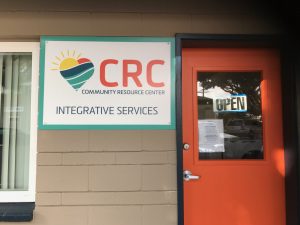Navigating the Road to Self-Sufficiency
August 17, 2017
Written by: Guest contributor, Lisa Shaffer
Lisa Shaffer and her husband, Steve Bartram, are long-time CRC supporters. Lisa served on the Encinitas City Council from 2012-2016.
 While I waited for my meeting with CRC staff members, Miranda, Chad, and Lauren, to learn more about Integrative Services and Case Management, I saw the program in action. A young man went to the intake window. He explained that he had lost his passport and needed proof of identification to show his new employer. He wanted to know if he could get mail sent to him so his dad could send his birth certificate. The intake staff asked questions, including where he had slept last night. She explained that he might be able to set up mail service, but only after seeing a case manager first so he could be assessed, and provided services he might need. The case manager might be able to help him with housing as well as supporting his employment needs. He also asked if there was a computer he could use and was directed to the Encinitas library. Once a person is enrolled and working with a case manager, they can access CRC’s computer lab.
While I waited for my meeting with CRC staff members, Miranda, Chad, and Lauren, to learn more about Integrative Services and Case Management, I saw the program in action. A young man went to the intake window. He explained that he had lost his passport and needed proof of identification to show his new employer. He wanted to know if he could get mail sent to him so his dad could send his birth certificate. The intake staff asked questions, including where he had slept last night. She explained that he might be able to set up mail service, but only after seeing a case manager first so he could be assessed, and provided services he might need. The case manager might be able to help him with housing as well as supporting his employment needs. He also asked if there was a computer he could use and was directed to the Encinitas library. Once a person is enrolled and working with a case manager, they can access CRC’s computer lab.
This young man was clearly stressed and frustrated. He was treated with respect and professionalism. He was able to complete some paperwork in order to start the process of receiving services, and even though his problem was not immediately solved, he had taken the first step and was assured that help was possible. In other words, he was given hope.
I had never thought about where people who are homeless get mail. Or how they check websites or get email needed to secure social services and keep in contact with family. Once you are in the CRC network, those problems can be solved. Think about how hard it is for a homeless person to complete the daily tasks that most of us take for granted. On a typical morning, we might get up from our comfortable, clean bed, take a shower, eat healthy food, put on clean clothes, and drive our car to work. For a homeless person, if they have a job, just being able to arrive at work on time and in good condition can be an enormous challenge. Most CRC participants have more than one issue they are dealing with, but whatever their situation, the intake process is the first step.
CRC helps participants navigate the myriad of challenges that have led them to this point. Case managers work with them to develop a road map and figure out what needs to happen, in what order, to move the client toward self-sufficiency. CRC participants have access to an array of programs, guided by a compassionate and skilled case manager. Services and resources include video conference connections with County staff to complete applications for food assistance or health insurance; clothing vouchers; help with transportation for employment; help with utilities and housing costs; assistance paying for a driver’s license; access to a computer lab and printing assistance; and much more.
CRC is like a GPS navigation system …
CRC is like a GPS navigation system – once there is an agreed roadmap, the case manager is that voice telling the participant which route may be best, alerting them to hazards in the way, and if they make a wrong turn or hit a dead end, redirecting them around obstacles to make sure they reach their destination.
Sometimes one intervention is all that’s needed – maybe they just needed access to a computer and printer; maybe help getting valid identification documents or filing for a tax refund. Maybe it’s a family that has limited income and is facing a rent increase. They need help paying the utility bill until the income earner returns to work after an illness. Those are the relatively easy cases. Maybe it’s a bigger challenge, like a woman I heard about who has been steadily employed for ten years, has one child and is expecting her second. She sleeps in her car because, even though she has income, she can’t find a landlord with available housing. Or it could be someone with serious mental or physical health challenges who needs professional intervention before they can consider employment.
The case managers at CRC are miracle workers who deal in hope.
The case managers at CRC are miracle workers who deal in hope. They handle huge caseloads – there are about 100 households being served at any one time, with three case managers. The long-term collaborative relationships CRC has developed with San Diego County and the many social service agencies in the region help CRC participants get expedited access to the help they need. The special and deep relationships they develop with their participants allow those in need to share with assurance and transparency, without fear of being judged or rejected. Through the trust that is built with time, with the respect that staff shows to those they serve when they greet them by name and look them in the eye as they pass in the corridor, a bond is established that allows for an honest assessment, setting realistic goals, and providing meaningful support.
I take great comfort knowing that CRC is there for us. Anyone needing help can find assistance here. The wonderful staff are committed to finding solutions. They work as a team and take care of each other. Miranda said “it is humbling to have people trust you with their secrets.” I find it humbling to meet and learn about the life-transforming programs offered by CRC through its integrated approach to service.
So what can you do to help?
The biggest needs in integrative services are for space, a persistent challenge for all areas of CRC. The staff sometimes plays round-robin with office and meeting rooms. They can’t accommodate more volunteers because there’s no place to put them. CRC would benefit by finding additional meeting space for our volunteers or community based meetings.
Even more important is the lack of housing units. For many participants, there are subsidies and vouchers available, but there aren’t enough rental units open at an affordable cost. This is a hot topic at local, state and national levels. Advocacy for more affordable housing programs is important at all levels. The housing crisis affects us all, whether we have aging parents needing to downsize or young adult children trying to get started, or if we are just compassionate members of a diverse community that cares about everyone. We all deserve a safe place to live.
[helpme_button style=”three-dimension” size=”large” bg_color=”#00A8A1″ txt_color=”#fff” outline_skin=”#444444″ outline_hover_skin=”#fff” icon=”theme-icon-video” url=”https://crcncc.org/integrative-services” target=”_self” align=”left” id=”Button ID” margin_bottom=”15″]Learn more [/helpme_button]
[helpme_button style=”three-dimension” size=”large” bg_color=”#00A8A1″ txt_color=”#fff” outline_skin=”#444444″ outline_hover_skin=”#fff” icon=”theme-icon-video” url=”https://crcncc.org/donate-inkind-items/” target=”_self” align=”left” id=”Button ID” margin_bottom=”15″]See our Wish Lists [/helpme_button]
